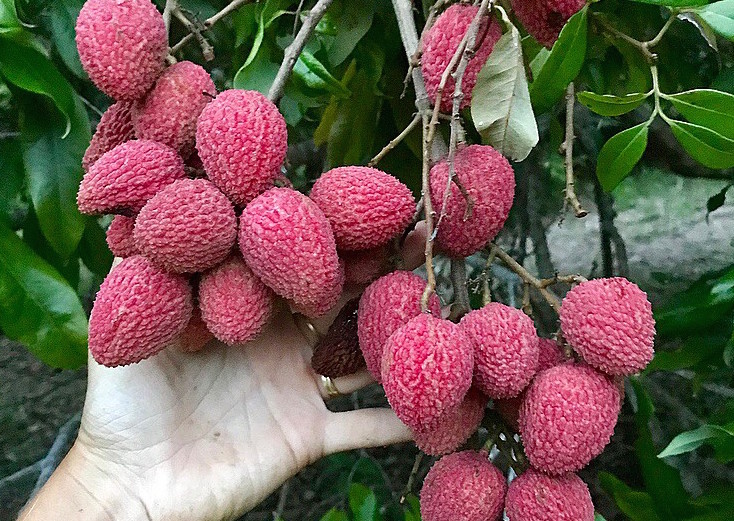To say “lychee”, pronounce it as “lee-chee”. Lychee is a tropical fruit with a sweet, juicy flavor and a rough, bumpy outer skin.
It is commonly used in Asian cuisine and is popular for its unique taste and refreshing texture. The fruit is also rich in antioxidants and vitamin C, making it a healthy and delicious snack option. We will explore the origins of lychee, its health benefits, and how to incorporate it into various dishes.
Whether you’re a fan of exotic fruits or looking to expand your culinary horizons, lychee is a fantastic addition to your diet. Join us as we delve into the wonderful world of lychee and discover all that this delectable fruit has to offer.

Mastering The Sound Of Lychee
When it comes to mastering the sound of ‘lychee’, it’s essential to pay attention to the correct pronunciation. Lychee is commonly mispronounced as “lie-chee” or “lee-chee”, but the correct enunciation is “lee-chee”. The emphasis should be on the first syllable, with a quick, clear pronunciation of both syllables. Take note of the correct syllable emphasis to avoid any mispronunciations.
Variations In Lychee Pronunciation
Lychee is a fruit with a sweet and juicy flavor, but its pronunciation can vary widely across regions and languages. In some regions, it may be pronounced as lee-chee, while in others, it might be lie-chee. In certain languages, such as Mandarin and Cantonese, the word for lychee is pronounced differently as lai-chee or litchi. Regional accents and dialects can also play a significant role in how the word lychee is spoken and understood, leading to a diverse range of pronunciations. Whether it’s lee-chee or lie-chee, the unique variations in how people say lychee add to the richness and diversity of language and culture.
Practice Techniques For Perfect Pronunciation
When learning to pronounce “lychee,” utilizing phonetic spelling can be beneficial. This method can help you accurately imitate the sound without any ambiguity. Audio resources are also valuable for auditory learning, allowing you to hear the correct pronunciation firsthand. Additionally, understanding the role of tongue and mouth position in forming the word is crucial for mastering its pronunciation. By practicing these techniques, you can confidently pronounce “lychee” with precision.
A phonetic spelling of “lychee” can aid in understanding its pronunciation. By breaking down the word into its phonetic components, you can grasp the exact sounds it contains.
Listening to audio recordings of native speakers saying “lychee” can enhance your auditory recognition of the word’s pronunciation.
Conscious awareness of tongue and mouth positioning while articulating “lychee” is key to achieving accurate pronunciation.
Learning From Native Speakers
When learning how to say “lychee”, it can be helpful to watch video tutorials by native speakers to understand the correct pronunciation. Engaging in language exchange programs also provides an opportunity to practice speaking with native speakers, improving both fluency and pronunciation. Listening to native speakers helps familiarize individuals with the exact sounds of the language, allowing for better comprehension and more accurate mimicking of pronunciation. This type of exposure to native pronunciation enhances the overall understanding and proficiency of the language being learned.
Using Lychee In Sentences
Understanding how to say lychee in different contexts can add flavor and depth to your conversation. When talking about using lychee in sentences, it’s important to find natural ways to incorporate it. Whether discussing the contextual use of lychee in conversation or integrating it into culinary discussions, the key is to use it seamlessly. When referring to lychee in a sentence, ensure it flows organically and fits the context effortlessly. This can help in crafting sentences that appeal to both the taste and imagery of lychee, enhancing the overall communication experience.
Lychee Pronunciation Fun Facts
Lychee is a fruit native to China, with its name originating from the Cantonese word “lai chi.” In popular culture, lychee has made appearances in various media such as movies, music, and literature, often symbolizing love and romance. The pronunciation of lychee can sometimes be a subject of trivia, with different regions and languages offering their own variations. The origins and history of the word “lychee” provide insight into its etymology and cultural significance. From its early cultivation in China to its spread across Asia and eventually to other parts of the world, the journey of the lychee fruit is rich with history. Understanding the various cultural and linguistic influences on the pronunciation of lychee adds an extra layer of intrigue to this delightful fruit.
Frequently Asked Questions Of How To Say Lychee
How Do Asians Say Lychee?
Asians say “lychee” as “lee-chee” or “lie-chee. ” The pronunciation may vary based on regional accents.
What Do The Chinese Call Lychee?
The Chinese call lychee “lìzhī. ” It’s a popular fruit in Chinese cuisine.
What Is The Difference Between Lychee And Litchi?
Lychee and litchi are two names for the same fruit. There is no difference between them. Both terms refer to the tropical fruit with a red, rough outer skin and sweet, juicy flesh inside.
What Do Lychees Taste Like?
Lychees have a sweet, floral taste with juicy, refreshing flesh and a hint of tartness. The flavor is similar to a mix of grapes and strawberries.
Conclusion
To sum it up, learning how to say “lychee” correctly can be a bit challenging, but it’s definitely worth the effort. Whether you prefer the American or British pronunciation, the delicious fruit remains the same. So, embrace the diversity of language and enjoy the sweet, juicy goodness of this tropical treat.
